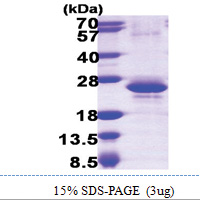RBM8A / RBM8 (1-174, His-tag) Human Protein
Other products for "RBM8A"
Specifications
| Product Data | |
| Species | Human |
| Expression Host | E. coli |
| Expression cDNA Clone or AA Sequence |
MADVLDLHEA GGEDFAMDED GDESIHKLKE KAKKRKGRGF GSEEGSRARM REDYDSVEQD GDEPGPQRSV EGWILFVTGV HEEATEEDIH DKFAEYGEIK NIHLNLDRRT GYLKGYTLVE YETYKEAQAA MEGLNGQDLM GQPISVDWCF VRGPPKGKRR GGRRRSRSPD RRRRLEHHHH HH
|
| Tag | His-tag |
| Predicted MW | 20.9 kDa |
| Concentration | lot specific |
| Purity | >90% |
| Presentation | Purified |
| Buffer | Presentation State: Purified State: Liquid purified protein Buffer System: 20 mM Tris-HCl buffer (pH 8.0) containing 10% glycerol, 0.1M NaCl, 1 mM DTT |
| Preparation | Liquid purified protein |
| Protein Description | Recombinant human RBM8A protein, fused to His-tag at C-terminus, was expressed in E.coli and purified by using conventional chromatography. |
| Storage | Store undiluted at 2-8°C for up to two weeks or (in aliquots) at -20°C or -70°C for longer. Avoid repeated freezing and thawing. |
| Stability | Shelf life: one year from despatch. |
| Reference Data | |
| RefSeq | NP_005096 |
| Locus ID | 9939 |
| UniProt ID | Q9Y5S9, A0A023T787 |
| Cytogenetics | 1q21.1 |
| Synonyms | BOV-1A; BOV-1B; BOV-1C; C1DELq21.1; DEL1q21.1; MDS014; RBM8; RBM8B; TAR; Y14; ZNRP; ZRNP1 |
| Summary | This gene encodes a protein with a conserved RNA-binding motif. The protein is found predominantly in the nucleus, although it is also present in the cytoplasm. It is preferentially associated with mRNAs produced by splicing, including both nuclear mRNAs and newly exported cytoplasmic mRNAs. It is thought that the protein remains associated with spliced mRNAs as a tag to indicate where introns had been present, thus coupling pre- and post-mRNA splicing events. Previously, it was thought that two genes encode this protein, RBM8A and RBM8B; it is now thought that the RBM8B locus is a pseudogene. There are two alternate translation start codons with this gene, which result in two forms of the protein. An allele mutation and a low-frequency noncoding single-nucleotide polymorphism (SNP) in this gene cause thrombocytopenia-absent radius (TAR) syndrome. [provided by RefSeq, Jul 2013] |
| Protein Families | Druggable Genome |
| Protein Pathways | Spliceosome |
Documents
| FAQs |
| SDS |
Resources
Recombinant Protein Resources |
{0} Product Review(s)
0 Product Review(s)
Submit review
Be the first one to submit a review
Product Citations
*Delivery time may vary from web posted schedule. Occasional delays may occur due to unforeseen
complexities in the preparation of your product. International customers may expect an additional 1-2 weeks
in shipping.






























































































































































































































































 Germany
Germany
 Japan
Japan
 United Kingdom
United Kingdom
 China
China
